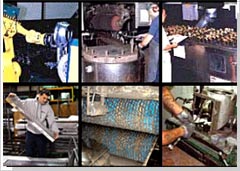 Metal finishing constitutes a comprehensive range of methods that are exercised by most industries which manufacture metal parts. Generally, manufacturers execute the finishing after a metal part has been formed. Finishing can be any activity, which alters the surface of a workpiece to attain specific characteristics. Some common metal finishes include paint, lacquer, ceramic coatings, and other surface treatments.
Metal finishing constitutes a comprehensive range of methods that are exercised by most industries which manufacture metal parts. Generally, manufacturers execute the finishing after a metal part has been formed. Finishing can be any activity, which alters the surface of a workpiece to attain specific characteristics. Some common metal finishes include paint, lacquer, ceramic coatings, and other surface treatments.
The metal finishing industry usually categorizes plating operations as electroplating and electroless plating. Surface treatments comprises of chemical and electrochemical conversion, case hardening, metallic coating, and chemical coating.
ProcessesSome of the important metal finishing processes are -
- Heat Treating
- Welding
- Braze & Solder
- Metal Plating
- Metal Coating
- Metal Anodizing
- Galvanizing
Industrial Applications
Metal finishing has found applications in the manufacturing processes of different industries, including
- Automotive
- Electronics
- Aerospace
- Hardware
- Jewelry
- Heavy equipment
- Appliances
- Telecommunications
Without metal finishing, metal products would last only a fraction of their present lifespan due to corrosion and wear. Finishing is also done to improve electrical properties, to form and shape components, and to improve the bonding of organic coatings or adhesives. Often the finishing is exercised to meet consumer need for a decorative appearance.
Overall, metal finishing modifies the surface of metal products to enhance:
- Wear resistance
- Corrosion resistance
- Electrical resistance
- Hardness
- Electrical conductivity
- Torque tolerance
- Reflectivity and appearance (e.g., color or brightness)
- Tarnish resistance
- Solderability
- Hardness
- Chemical resistance
- Ability to bond to rubber (e.g., vulcanizing)
Metal finishers use several materials and processes to clean, etch, and plate metallic and non-metallic surfaces to produce a workpiece, which has the required surface characteristics. Electrolytic plating, electroless plating, and chemical and electrochemical conversion processes are generally used in the metal finishing industry. Some typical supporting processes include degreasing, cleaning, pickling, etching, and / or polishing.
Some of the materials used in metal finishing, include - solvents and surfactants for cleaning, acids and bases for etching, and metal salt solutions plating the finish onto the substrate.
Industry OverviewMetal finishing industry refers to businesses, which apply paints and coatings to metal surfaces. It include processes, which apply paint through chemical baths, spray applications, electro-deposition, and other mechanical applications.
Metal finishing industry constitutes of two types of businesses -
- Independent metal finishers generally referred to as "job shops" or "independent metal finishers"
- Captive metal finishers who undertake metal finishing processes as part of a larger manufacturing operation.
Captive operations may be more specialized in their operations, however, their metal finishing processes tend to be more efficient as they process a limited number of several parts. In other words, they know what they will finish each day and are more likely to fine-tune their equipment and processes to meet those daily requirements. Accordingly, when a process is running at maximum efficiency then less waste will be generated.
Job Shops are generally less specialized in their operations due to the fact that they serve many customers, often with different specifications and requirements. The need for operational flexibility to fulfill customer requirements often bounds the choices of alternative, more environmentally preferred processes.
Though the two metal finishing businesses may have different operating structures, the technologies used to finish parts are the same and hence have similar environmental impacts.
